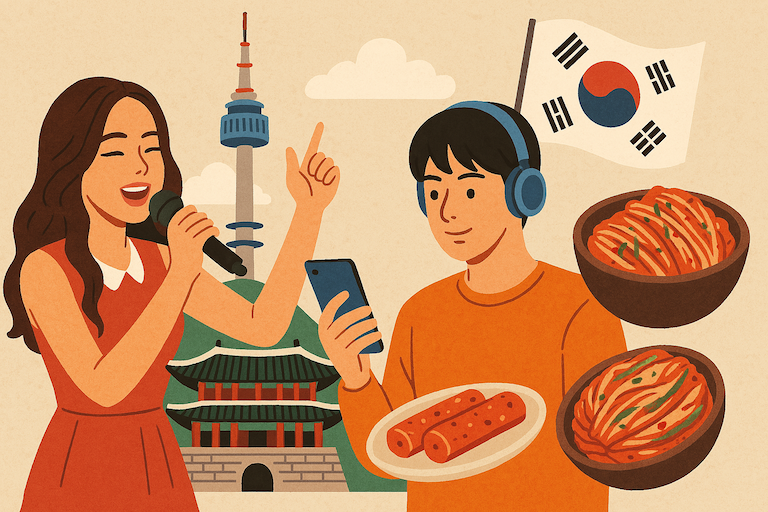“Korean culture around the world” wasn’t even a phrase I imagined I’d hear when I traveled to Europe in the 1990s.
Back then, most people would ask, “Are you Chinese? Japanese?”
And when I replied, “No, I’m Korean,” the most common reaction was a polite smile… and silence.
A Country No One Knew
Back then, Korea was virtually invisible on the global cultural map.
When I was young and traveled outside Asia — especially to Europe — I quickly realized how little the world knew about where I came from.
Sometimes, people would nod and say,
“Oh, Korea… is that a city in Japan?”
I remember feeling helpless. It wasn’t their fault.
There were no Korean dramas on Netflix, no international K-pop stars, no Hallyu.
Just a small country with a complicated past — and no global identity.
In fact, I even heard people ask me,
“Is Samsung a Japanese company?”
When It All Started to Change
In 2002, everything shifted — at least a little.
The FIFA World Cup in Korea and Japan introduced Korea to the world through football.
Red-shirted crowds, Korean cheers, and the magic of Guus Hiddink and Park Ji-sung made headlines.
For the first time, people said:
“Oh! South Korea? You guys were incredible at the World Cup!”
Still, the knowledge stopped at sports.
Try talking about Korean movies, food, or fashion — you’d still get blank stares.
Korean Culture Around the World: Slowly Then All At Once
Back in 2005, I played a catchy Korean pop song for a friend in Bangkok.
He shrugged and said, “Is this Famous in Korea?”
No one knew the names. No one cared.
Fast forward a few years, I returned to the same airport in Bangkok — and what did I see?
Teenagers holding flower bouquets, screaming at the arrival gate, waiting for…
yes, those same “unknown” Korean artists.
Except now, they were superstars.
What used to be met with polite indifference had suddenly become a phenomenon.
K-dramas started popping up on prime-time TV.
Gangnam Style hit like a global lightning bolt — suddenly, everyone was doing the horse dance, from Times Square to Bangkok.
Then came the avalanche.
BTS. BLACKPINK.
“Crash Landing on You,” “Kingdom,”
And then — Parasite won the Oscar.
That one hit me hard.
A film so unmistakably Korean — yet the entire world seemed to understand it.
People weren’t just enjoying Korean culture anymore —
they were feeling it.
It was like watching a quiet drizzle turn into a tidal wave.
Korea had arrived — not with a bang, but with a rhythm.

How Korean Culture Around the World Became Unexpectedly Universal
These days, I don’t see people chasing trends —
but I feel Korean culture around the world, quietly and naturally.
In cities like Bangkok, Kuala Lumpur, and San jose, Korean restaurants no longer stand out like exotic novelties.
They sit alongside local food spots — not flashy, just familiar.
No crowds taking photos. No “new trend” hype.
Just locals eating tteokbokki, samgyeopsal, or bibimbap like it’s part of everyday life — because in many ways, it is now.
This quiet integration is one of the most remarkable signs of Korean culture around the world.
It’s no longer about momentary hype — it’s about cultural presence with staying power.
In Singapore, I passed a glowing billboard with a Korean actor — not promoting a drama, but representing a luxury brand.
No one seemed surprised. That’s when it hit me:
Korean culture around the world isn’t a temporary wave. It’s settling in.
At an airport lounge in Hong Kong, I heard a K-pop track playing softly in the background.
No one turned heads. No one commented.
It simply played, like any other familiar global sound — like jazz, or Billboard pop.
It’s not loud. It’s not always viral.
But it’s lasting.
Korea is no longer a guest in global culture —
Korean culture around the world has become part of the fabric.
That shift — from being a surprising guest to becoming a natural part of daily life —
that’s what feels most powerful to me.
Still Small, But Full of Stories
Yes — Korea is still a small country.
We’re not the biggest economy, or the loudest voice in the room.
Compared to giants like Japan, China, or the U.S.,
our footprint may still feel modest.
But that’s exactly why there’s so much more to share.
Because Korea isn’t about overwhelming the world —
it’s about quietly surprising it.
With music that moves you.
With flavors that linger.
With values that make you think.
With stories that stay with you.
We’ve come far — from being mistaken as a city in Japan
to becoming part of everyday playlists, recipes, and conversations.
And yet, I believe we’re still only at the beginning.
So What Do You Want to Know?
There’s still so much I’d love to tell you —
about our traditions, our humor, our daily lives, our dreams.
But I don’t want to say too much at once.
Instead, I’ll wait.
Until you get curious enough to ask.
And when you do?
I’ll be ready —
to tell you everything.